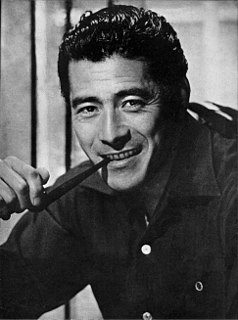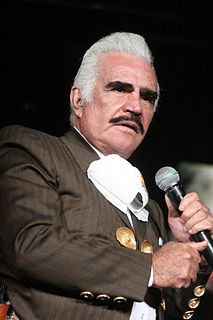Contents
A list of the most films produced in the Cinema of Mexico ordered by year of release in the 1980s. For an alphabetical list of articles on Mexican films see Category:Mexican films.
A list of the most films produced in the Cinema of Mexico ordered by year of release in the 1980s. For an alphabetical list of articles on Mexican films see Category:Mexican films.
Alien primarily refers to:

Sketch comedy comprises a series of short, amusing scenes or vignettes, called "sketches", commonly between one and ten minutes long, performed by a group of comic actors or comedians. The form developed and became popular in vaudeville, and is used widely in comedy and variety shows, talk shows, and some children's television series. The sketches may be improvised live by the performers, developed through improvisation before public performance, or scripted and rehearsed in advance like a play. Sketch comedians routinely differentiate their work from a "skit", maintaining that a skit is a (single) dramatized joke while a sketch is a comedic exploration of a concept, character, or situation.

Toshiro Mifune was a Japanese actor who appeared in over 150 feature films. He is best known for his 16-film collaboration (1948–1965) with Akira Kurosawa in such works as Rashomon, Seven Samurai, The Hidden Fortress, Throne of Blood, and Yojimbo. He also portrayed Miyamoto Musashi in Hiroshi Inagaki's Samurai Trilogy and one earlier Inagaki film, Lord Toranaga in the NBC television miniseries Shōgun, and Admiral Isoroku Yamamoto in three different films.
A gangster is a criminal who is a member of a gang. Most gangs are considered to be part of organized crime. Gangsters are also called mobsters, a term derived from mob and the suffix -ster. Gangs provide a level of organization and resources that support much larger and more complex criminal transactions than an individual criminal could achieve. Gangsters have been active for many years in countries around the world. Gangsters are the subject of many novels, films, and video games.

Mexican cinema dates to the late nineteenth century during the rule of President Porfirio Díaz. Seeing a demonstration of short films in 1896, Díaz immediately saw the importance of documenting his presidency in order to present an ideal image of it. With the outbreak of the Mexican Revolution in 1910, Mexican and foreign makers of silent films seized the opportunity to document its leaders and events. From 1915 onward, Mexican cinema focused on narrative film.

Alejandro González Iñárritu is a Mexican film director, producer and screenwriter. He is primarily known for making modern psychological drama films about the human condition. His projects have garnered critical acclaim and numerous accolades including eight Academy Awards with a Special Achievement Award, six Golden Globe Awards, eight British Academy Film Awards, two American Film Institute Awards, two Directors Guild of America Awards and a Producers Guild of America Award. His most notable films include Amores perros (2000), 21 Grams (2003), Babel (2006), Biutiful (2010), Birdman (2014), and The Revenant (2015).

Vicente Fernández Gómez was a Mexican singer, actor, and film producer. Nicknamed "Chente", "El Charro de Huentitán", "El Ídolo de México", and "El Rey de la Música Ranchera", Fernández started his career as a busker, and went on to become a cultural icon, having recorded more than 50 albums and contributing to more than 30 films. His repertoire consisted of rancheras and other Mexican classics.
This is an index of lists of films by year, awards, countries of origin and genre among other factors.
A list of the most notable films produced in the Cinema of Mexico split by decade of release. For an alphabetical list of articles on Mexican films see Category:Mexican films.

Luis Mandoki is a Mexican film director working in Mexico and Hollywood.

Eugenio González Derbez is a Mexican actor, comedian, and filmmaker.
Latin American cinema refers collectively to the film output and film industries of Latin America. Latin American film is both rich and diverse, but the main centers of production have been Argentina, Brazil and Mexico. Latin American cinema flourished after the introduction of sound, which added a linguistic barrier to the export of Hollywood film south of the border.

Nuevo Cine Mexicano, also referred to as New Mexican Cinema is a Mexican film movement started in the early 1990s. Filmmakers, critics, and scholars consider Nuevo Cine Mexicano a "rebirth" of Mexican cinema because of the production of higher-quality films. This rebirth led to high international praise as well as box-office success, unseen since the golden age of Mexican cinema of the 1930s to 1960s. The quality of Mexican films suffered in the decades following the golden age due in part to Mexican audiences watching more overseas films, especially Hollywood productions. This resulted in the rise of infamous Mexican genres such as Luchador films, sexicomedias and ultimately the low-budget direct-to-video Mexploitation film.

Mexploitation is a film genre of low-budget films that combine elements of an exploitation film and Mexican culture or portrayals of Mexican life within Mexico often dealing with crime, drug trafficking, money and sex.
The Mexican sex comedies film genre, generally known as Ficheras film or Sexicomedias was a genre of sexploitation and Mexploitation films of the Mexican cinema that flourished in the 1970s and 1980s. It is recognized as a collection of usually low quality films with low budgets. Although the films had sexual tones and used double entendre, they were not particularly explicit. The genre is possibly based on the Italian erotic comedies. The popular term for it came from the film Las ficheras, produced and released in 1975, which described the experiences of many women who entertained men at nightclubs.
Events in the year 1980 in Mexico.